A herniated disc, also known as a slipped or ruptured disc, is a common spinal injury that occurs when the soft, jelly-like substance in the center of a spinal disc protrudes through a tear in the outer layer of the disc. This can cause pain, numbness, and weakness in the affected area, and can even result in nerve damage if left untreated.
Herniated Disc Symptoms
The early symptoms of a herniated disc include:
- Back pain
- Numbness in the legs
- Muscle weakness
- Pain near your shoulder blades
- Pain radiating to shoulder, arm and hand, and fingers
- Neck pain (back and sides)
- Pain during bending or turning your neck
- Numbness or tingling in your arms
Herniated Disc Causes
The most common causes of a herniated disc are:
- Aging
- Excessive weight
- Repetitive motions
- Sudden strain from improper lifting or twisting
Herniated Disc Diagnosis
Your doctor will recommend the below tests to confirm the diagnosis
- Magnetic resonance imaging (MRI)
- X-rays
- Computed tomography (CT)
- Myelogram
- Electromyogram (EMG)
Herniated Disc Treatment
Your doctor may recommend the below treatment options:
- Medication: Your doctor may prescribe an anti-inflammatory pain killer or muscle relaxant medication
- Physical therapy: Helps relieve pressure on your nerves. Exercise loosens tight muscles and improves circulation.
- Spinal injections: Reduces nerve swelling and nerve inflammation from the disc herniation. It allows your body to heal and return to activity faster.
- Herniated Disc Surgery: In rare cases, a large, herniated disc might injure the bladder or bowel nerves that may require emergency surgery. For non-emergency cases, surgery is an approach when other treatments fail. There are several ways to perform spinal decompression surgery, but the goal is to relieve pressure on the nerve.
Chiropractic Care For Herniated Disc
Chiropractic care may be helpful for some individuals with herniated discs, but it is important to note that it is not a universally effective treatment for everyone.
Chiropractic care for a herniated disc typically involves spinal manipulation, which aims to realign the spine and relieve pressure on the affected disc. The chiropractor may also use other techniques, such as massage or stretching, to help reduce pain and inflammation.
It is important to note that chiropractic care should not be used as a substitute for medical treatment, especially in cases where the herniated disc is severe or causing nerve damage. In such cases, surgical intervention may be necessary.
Before undergoing chiropractic care for a herniated disc, it is important to consult with a qualified chiropractor and your primary care physician or specialist to ensure that this treatment is appropriate for your specific condition and health needs.
Conclusion
A herniated disc can cause significant pain and discomfort, making it difficult to perform daily activities. However, with proper diagnosis and treatment, many people are able to manage their symptoms and improve their quality of life. If you suspect that you may have a herniated disc, it is important to consult with a healthcare professional to determine the best course of action for your individual needs.


